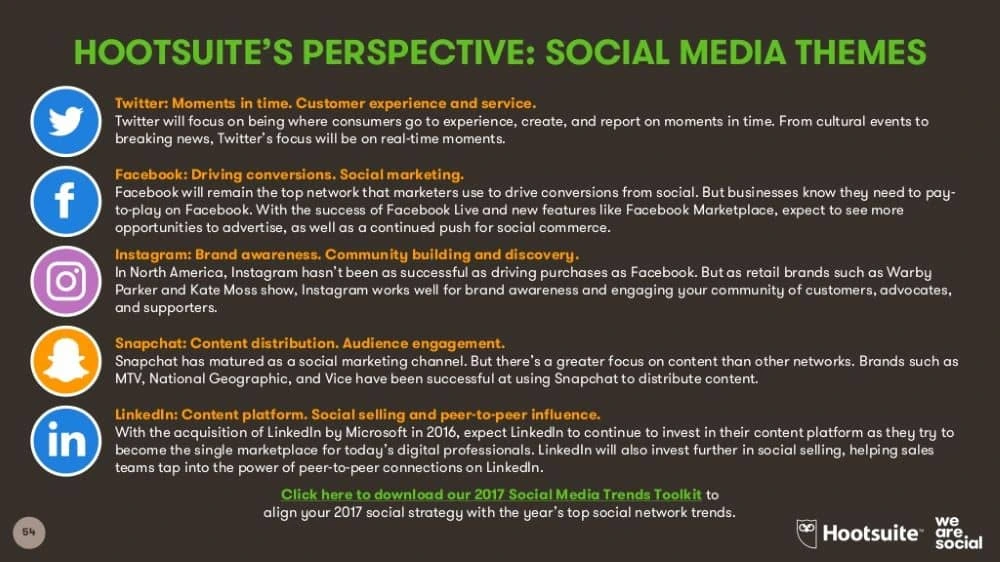If you’re serious about upping your social media game, then brand consistency is key.
Many new businesses underestimate the amount of time and effort that goes into creating a social media presence that counts, and social media marketing is often seen as a cheap and cheerful way to spread the word about your business. While social media can be a fun and cost-effective marketing tool, it does eat up a lot of time. If you’re keen to invest that time in developing social feeds that make a difference to your business, you’ll need to have social media guidelines for keeping your brand consistent.
Related: How to drive traffic with social media
5 benefits to brand consistency on social media
Accomplishing brand consistency on social media isn’t easy, but it is achievable. Before we tackle how you can achieve it, let’s first consider why it matters.
It makes you memorable.
There are 500 million tweets sent every day, with 6,000 going out every second. When users see online content from a brand they can easily recognize, they’re more likely to remember them in the future, both online and offline.
It increases customer engagement and loyalty.
If customers remember and recognize a brand, they’ll feel much more comfortable interacting with them. Likewise, customers are more likely to stay loyal to brands who deliver a consistent message.
It helps you stand out from the crowd.
Having a brand that is easily recognized will help to set you apart from your competitors. There are 6 Facebook profiles created every second, resulting in around 500,000 new users every day. If you’re not consistent in branding your business across the various platforms you use, it can be easy to get lost in the crowd.
It gives you authority.
Branding that’s done well looks professional. It builds trust because it tells your audience that you know what you’re doing and you care about the details.
It makes you relatable.
Using social media to show the unique personality of your brand is an effective way of helping customers relate to you.
Tips for branding your social profiles consistently
To achieve visual brand consistency when setting up your social profiles, there are a few key things you’ll need to remember.
Names & handles
If you want your customers to be able to find you easily as they move from one platform to another, it’s important that your name and handle is the same wherever you are.
Colors & logos
Even before they read your name or bio, visitors will register your logo and the colors you’ve used. Make sure that these two things represent your brand in the right way. They should match your website and any other communications that go out to your customers.
Taglines
If your business has a tagline, display it prominently on your social profiles. Taglines are memorable, and using yours consistently will help your customers recognize you.
Still working on your brand basics? Read more: The 7 key elements of brand identity design
3 questions to ask before you start posting
Next, we’ll look at keeping your brand consistent when you post on social media—but before we do, here are a few important questions you’ll need to have the answers to.
Who is your audience?
The internet has 3.77 billion users and 2.78 billion of those are active social media users. To ensure your social media content is directed at the right sort of people for your business, you’ll need to understand a few things about your target audience. How do they identify themselves? What are their interests? What motivates them?
Who is the audience on each network?
Not everyone is on every social network, and if they are on two or more, it’s likely for different reasons. Consider what your target audience expects when they visit each social platform and how you can provide the content they’re looking for.
Social media management platform Hootsuite predicts growth in the following themes for 5 top social platforms:

What language and tone will you use?
Deciding in advance whether you’ll use “we” or “I,” whether you’ll be funny or serious, and whether you’ll stick to perfect English or use slang and text-speak is an important move. There’s no wrong answer, it’s just about deciding what’s right for your audience. Once you know, make sure everyone in your business who posts is consistent.
Tips for social media posts with brand consistency
Once you’ve got answers to the questions above, you can start to think about when and how you’ll post and what you’ll share where.
Don’t just advertise.
The most successful brand accounts have a following because they offer something that their followers value. If you’re using social media just to promote and advertise, your audience will unfollow. What else will you offer: Promotions? Behind the scenes insight? Helpful information? Technical support? If you’re not sure where to start, check out the competition and see what works for them.
Post regularly and consistently.
Creating a social media account that stands unused can be harmful to your business. If a customer searches for you and sees that you haven’t posted for a while, they may assume that your business has closed.
Posting consistently can also help you develop a relationship with your audience and increase engagement. If they know when to expect a certain type of post from you that they appreciate, they’ll look out for it and may even begin to interact with you.
Consider your posting frequency per platform.
Posting regularly doesn’t have to mean posting all the time. It’s about quality over quantity. The frequency of your posts should depend on both the relevancy of your content and the platform you’re using. Do some research to find optimal times for posting based on platform and then set a schedule. There are free tools available online that will help you stick to it.
Curate content that fits.
Creating quality content for multiple social media platforms is a full-time job and, if your business is small, you simply might not have the resources. But you shouldn’t let that stop you from posting regularly. Sharing content from other people and businesses that echo your brand’s message is an effective way to keep the ball rolling while you’re working on other things.
Repurpose old content.
Likewise, there’s no reason why you shouldn’t repurpose old content. Share old posts that recent followers may have missed, or transform the content into something new. You could create an infographic from a long blog post, for example, or try breaking it up into smaller pieces and expanding on each one.
Don’t be repetitive.
While it’s important to post regularly, you should be aware of sounding repetitive. Don’t bombard your followers with the same message again and again, and be careful not to publish the exact same post across all your channels at the same time. Active social media users tend to jump from platform to platform within the space of minutes—if they’re seeing the exact same post from you wherever they go, they’ll start to feel overwhelmed by your content.
With that being said, if you’re running a big promotion or have an important announcement, you should certainly feature it across all of your social platforms. Instead of sending it out across multiple channels at one time, consider when the best times for posting on each channel are and stagger your message accordingly.
Link & cross-reference.
Don’t forget to link and cross-reference your social accounts. If you’re running a special promotion on Facebook, let your Twitter followers know. Likewise, if you have some content on Snapchat that you’re proud of, mention it on Instagram. Try only to do this when you have something your followers will appreciate—do it too much and you risk being repetitive.
Document your brand guidelines
There’s a lot to understand and remember, isn’t there?
If you’re committed to developing a social media presence that is both beneficial to and consistent with your brand, it’s worth considering documenting your brand guidelines.
Learn more about brand guidelines: 10 examples of great brand guidelines
Key takeaways
To achieve brand consistency on social media:
- Take care to ensure your profiles look similar and that they match your overall brand identity, including your website, newsletters and any other communications that go out to your customers.
- Make sure you know exactly who your posts are directed at and how you’ll communicate consistently with those people.
- Develop a social media content plan that outlines when and where you’ll post and how often. Work on ideas in advance and don’t be afraid to repurpose and curate, as long as you’re sticking with your overall brand message.



